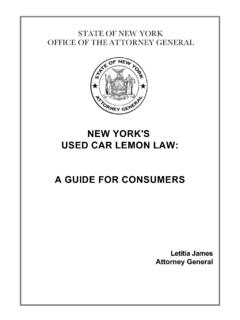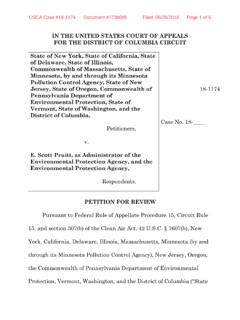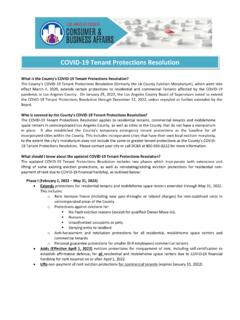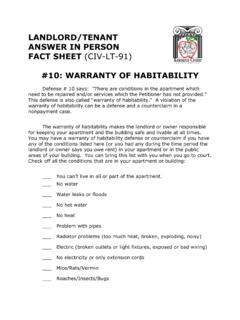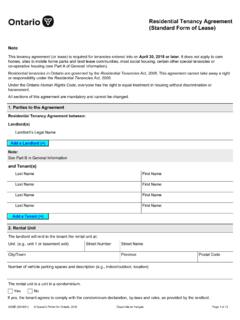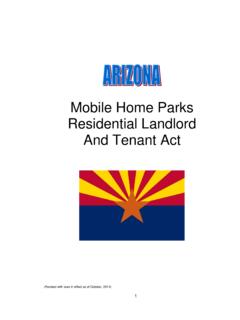Transcription of A HOUSING GUIDE FOR SENIOR CITIZENS - Attorney General …
1 NEW YORK STATE OFFICE OF THE Attorney GENERALA HOUSING GUIDE FOR SENIOR CITIZENSANDREW M. CUOMOATTORNEY GENERALREVISED JULY 2006 Table of ContentsAge Discrimination1 Protection Against Harassment1 Primary Residence1 Remaining in a Rent Regulated Apartment2 Lease Succession Rights2 Apartment Sharing3 SENIOR Citizen Rent Increase Exemption (SCRIE)3 Mitchell-Lama Housing4 Cooperative and Condominium Conversion5 Cooperatives5 Condominiums5 Protections for SENIOR CITIZENS During Conversion5 ALTERNATIVE HOUSING SENIOR Citizen Lease Terminations6 Shared Housing7 Home Equity Conversion8 Accessory Apartments8 Elder Cottages9 Assisted Living9 Naturally Occurring Retirement Communities9IN-HOME ASSISTANCE SENIOR Citizen Apartments10 Enriched Housing10 Home Care10 FINANCIAL ASSISTANCE STAR11 Real Property Tax Credit: The Circuit Breaker11 Home Repair Loans and Grants Program11 Partial Real Property Tax Exemptions12 Emergency Assistance to Families with Children (EAF)12 Emergency Assistance for Adults (EAA)13 Federal Assistance13 HELP WITH ELECTRIC AND GAS UTILITIES The Home Energy Assistance Program (HEAP)13 Weatherization Referral and Packaging Program (WRAP)14 Home Energy Fair Practices Act (HEFPA)14 Utility Deposits14 Utility Shutoff14 Other Assistance with Utility Emergencies15 HELP WITH TELEPHONE SERVICE Telephone Fair Practices (TEFPA)
2 15 Local Telephone Service Deposit15 Local Telephone Service Shutoff or Suspension16 Life Line Telephone Service16 Telephone Calling Help for People with Disabilities16 DIRECTORY181A HOUSING GUIDE for SENIOR CitizensAge DiscriminationLandlords and real estate agents may not discriminate against a current or potential tenant byrefusing to renew a lease or rent an apartment on the basis of age or disability. (Executive Law 296(5) and Fair HOUSING Act of 1988.) If you believe you were a victim of discrimination, youmay file a complaint with the NYS Division of Human Rights which will investigate yourcomplaint. You may also file a complaint with the New York State Attorney General 's CivilRights Bureau. (See Directory.)Protection Against HarassmentIt is unlawful for a landlord, or anyone acting on behalf of the landlord, to interfere with ordisturb the privacy, comfort or peace of the tenant in the occupancy of a rent regulatedapartment.
3 For example, a landlord may not interrupt or discontinue required services or bringbaseless court proceedings against a tenant for the purpose of causing the tenant to vacate theapartment or waive any legal protection. Landlords found guilty of harassment are subject tocivil fines and are not permitted to increase rents until the Department of HOUSING andCommunity Renewal (DHCR) finds that the harassment has ended. Landlords who are found tohave harassed tenants are subject to a fine of up to $5,000 for each violation. If you believe youare being harassed, you may file a complaint with the DHCR Enforcement Unit. (See Directory.)Primary ResidenceA tenant is entitled to remain in a rent-controlled or rent-stabilized apartment so long as thatapartment is the tenant 's primary residence. Rent stabilization applies to approximately onemillion apartments in New York City and in certain other localities that have adopted theEmergency tenant Protection Act.
4 (See Directory.) An apartment is considered a primaryresidence if the tenant resides in it on a regular basis. The courts have held that primaryresidence means an ongoing, substantial, physical connection with the apartment for actual livingpurposes which can be demonstrated by appropriate evidence. Such evidence may include thatthe residence serves as the mailing address for legal purposes such as for filing federal, state andlocal income tax returns; for receiving social security and other government benefits; for voting;and, as the billing address for credit card accounts. Additional evidence of primary residencemay be that the tenant 's personal belongings and household goods remain in the apartment andthe tenant pays the apartment's utility bills. A tenant may, of course, have a summer or winter residence, visit relatives or go on a vacationwhile still maintaining a primary residence. If it is necessary to remain in a nursing home orgeriatric facility for a prolonged period of time, a landlord may attempt to recover the apartmentby claiming in court that the apartment is no longer the tenant 's primary residence.
5 Courts have2rejected this attempt when evidence is offered to show that the tenant has no intention ofabandoning the apartment as the primary residence. A tenant is in an even stronger position ofretaining the apartment in a court action brought by the landlord to recover the apartment if adoctor can state that there is a reasonable possibility that the tenant may return home. Remaining in a Rent Regulated ApartmentIf a tenant , or any member of the tenant 's household, is 62 years of age or older and has lived in arent regulated, which includes rent-controlled and rent-stabilized (other than NYC rentstabilized), building for 20 years or more, the landlord may not recover the apartment for his orher own personal use as long as the lease is not violated. If the tenant or the tenant 's spouse is asenior citizen and lives in a NYC rent stabilized apartment, the landlord may not recover theapartment for his or her primary residence unless the tenant is offered a comparable apartment inthe same neighborhood at the same or lower regulated rent.
6 Lease Succession RightsThe DHCR issues regulations pertaining to the right of an individual living in a rent controlledor stabilized apartment to succeed a tenant of record who dies or permanently vacates. In a 1989 landmark case, the New York State Court of Appeals held that the term "familymember," with respect to rent controlled apartments, includes individuals who have shared theapartment and who have a relationship characterized by an emotional and financial commitmentand interdependence. Consistent with this broad definition of the term "family," DHCR amended its regulationsgoverning rent controlled and rent stabilized apartments to protect the lease succession and anti-eviction rights of both traditional and "nontraditional" family members who remain in anapartment after the named tenant dies or permanently vacates. Family member" is defined as husband, wife, son, daughter, stepson, stepdaughter, father,mother, stepfather, stepmother, brother, sister, grandfather, grandmother, grandson,granddaughter, father-in-law, mother-in-law, son-in-law, or daughter-in-law of the tenant , or anyother person residing with the tenant in the apartment as a primary residence who can proveemotional and financial commitment and interdependence between such person and the tenant .
7 Evidence to be considered by a court or DHCR in deciding whether someone qualifies as anontraditional family member may include: (a) longevity of the relationship; (b) sharing ofhousehold expenses; (c) sharing finances such as bank accounts, real property, credit cards, loansand/or a household budget for purposes of receiving government benefits; (d) engaging infamily-type activities by jointly attending family functions, holidays and celebrations, social andrecreational activities, etc.; (e) formalizing legal obligations such as mutual wills, shared powersof Attorney and authority to make health care decisions; (f) acknowledging one another as familymembers to other family members, friends, members of the community or religious institutions,or society in General through words or actions; (g) regularly performing family functions, such ascaring for each other's extended family, and/or relying upon each other for daily family services;3and (h) engaging in any other pattern or behavior, agreement, or other action which evidencesthe intention of creating a long term, emotionally committed relationship.
8 Under these regulations, a family member would succeed to the rights of the tenant of recordupon the tenant 's permanent departure or death, provided the family member lived with aprimary resident either (a) for not less than two years (one year in the case of disabled persons orsenior CITIZENS who are 62 years or older), or (b) from the commencement of the tenancy or therelationship (if the tenancy or relationship was less than the required two years or one-yearperiod, as the case may be.) Apartment SharingIt is unlawful for a landlord to restrict occupancy of an apartment only to the named tenant in thelease or to that tenant and immediate family. When the lease names only one tenant , that tenantmay share the apartment with immediate family, one additional occupant and the occupant'sdependent children provided that the tenant or the tenant s spouse occupies the premises as his orher primary residence.
9 When the lease names more than one tenant , these tenants may share their apartment withimmediate family, and, if one of the tenants named in the lease moves out, that tenant may bereplaced with another occupant and the dependent children of the occupant. At least one of thetenants named in the lease or that tenant 's spouse must occupy the shared apartment as his or herprimary residence. Tenants must inform their landlords of the name of any occupant within 30 days after theoccupant has moved into the apartment or within 30 days of the landlord's request for thisinformation. If the tenant named in the lease moves out, the remaining occupant has no right tocontinue in occupancy without the landlord's express consent. Landlords may continue to limit the total number of people living in an apartment to complywith legal overcrowding standards. Tenants can sue landlords who violate this law to restrain the landlord from denying the tenant 'srights, and to recover actual damages and court costs.
10 (Real Property Law 235-f.) SENIOR Citizen Rent Increase Exemption (SCRIE) SENIOR CITIZENS living in New York City and in certain other areas of the state may be exemptfrom rent increases under the SENIOR Citizen Rent Increase Exemption (SCRIE) program. In NewYork City, SCRIE is part of the City's administrative code. Outside New York City, SCRIE isapplicable to any locality subject to rent control or rent stabilization. To be eligible in New York City, the tenant or the tenant 's spouse must be 62 years or older, andhead of the household "named on the lease" or a " tenant of record" or the older spouse of thatperson, live in a rent-stabilized or rent-controlled apartment, have a household income for theprevious tax year not exceeding $24,000, and pay more than one-third of total income for rent.(In addition, in non-rent stabilized apartments, there must be an increase in rent in order to be4eligible for SCRIE, and the increase must be authorized as exemptible.)





